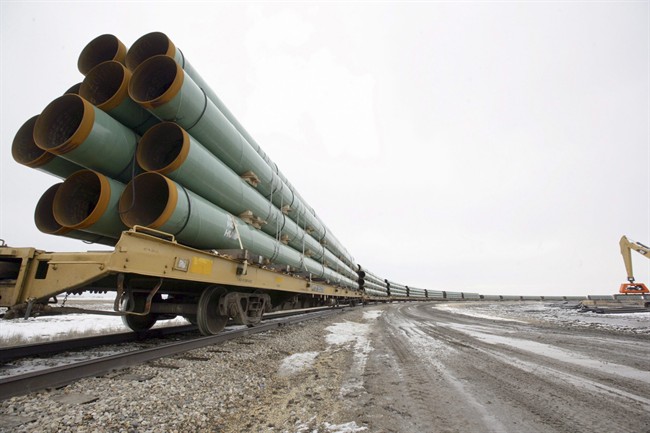America’s federal pipeline regulator is studying diluted bitumen to see whether the oilsands substance is any more dangerous when spilled from a pipeline than conventional oil.

It’s another question regarding the safety of TransCanada’s long-delayed Keystone XL pipeline, which Canadian politicians have expended significant political capital promoting abroad and which has run up against multiple barriers in the U.S., from landowners and environmentalists alike.
READ MORE: The Keystone saga
The U.S. Department of Transportation Pipeline and Hazardous Materials Safety Administration told a Congressional hearing earlier this week it plans to work with the National Academy of Sciences to study the effects of dilbit spills on the environment and human health, as this was part of its 2014 budget mandate. A spokesperson for the agency told Global News they don’t know when they’ll release the study.
READ MORE: Energy bill caught up in Keystone XL dispute
Diluted bitumen, or dilbit, is oilsands bitumen diluted with light petroleum so that it travels more smoothly through pipelines. While energy companies such as TransCanada have said it’s no more dangerous than conventional oil, two major spills in the United States – including Enbridge Inc.’s spill in Kalamazoo, Mich. in 2010 – have prompted researchers to question the unconventional oil’s environmental impact.
READ MORE: Watchdog: Pipeline safety oversight inadequate
The National Academy of Sciences has studied dilbit before: A study released in June, 2013 found dilbit’s properties not “outside the range of other crude oils” and that it doesn’t seem more likely than other crude oils to cause a spill.
TransCanada wouldn’t comment on this latest study, saying it hadn’t heard of it. But TransCanada spokesperson Davis Sheremata noted that studies have found bitumen and dilbit are safe.
“A study conducted by scientists for Natural Resources Canada released in November 2012 also found that bitumen is no more corrosive than conventional oil.”

That study appears to back up industry arguments that conventional oil and diluted bitumen behave in the same manner in pipelines.
But this latest study would focus on whether they have similar effects once a spill occurs – a much more pressing question, argues Bold Nebraska director Jane Kleeb, who’s been central to the fight against Keystone.
“That first [NAS] study was only comparing heavy American oil to heavy Canadian tar sands and that is not what any of us wanted to know. We already knew heavy oil is similar to heavy oil. What we always wanted to know was … how does [a dilbit spill] affect crop? How does that affect water and land?”
The U.S. regulator’s findings could help or hurt the oilsands’ reputation. But this study probably won’t affect Keystone’s fate directly, says Dinara Millington, Senior Research Director for the Canadian Energy Research Institute.
“Most likely, the Keystone XL is not going to be approved under the current administration,” she said.
“If it does come out that the dilbit is more hazardous than the conventional crude oil, there is still an economic case for the Keystone XL to go through because they can still ship conventional crude oil in that pipeline.”
- Life in the forest: How Stanley Park’s longest resident survived a changing landscape
- ‘Love at first sight’: Snow leopard at Toronto Zoo pregnant for 1st time
- Carbon rebate labelling in bank deposits fuelling confusion, minister says
- Buzz kill? Gen Z less interested in coffee than older Canadians, survey shows




Comments